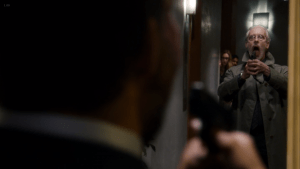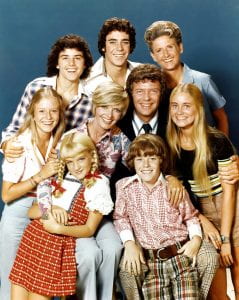Throughout the series so far Sense8 has been building up tension in various different plots. In episode seven, W. W. N. Double D? (What Would Nancy Drew Do?), many of these buildups reach an apparent climax by becoming entwined with one another, while also leaving room for further development. Here are two examples of this.
Joaquin, an enemy of Lito’s, has been stalking him for multiple episodes. Meanwhile Lito and his boyfriend Hernando are constantly worried that their romance will become public knowledge, potentially threatening Lito’s acting career as a straight sex-icon. In this episode Joaquin directly confronts Lito, steals his beard’s phone, and texts him a picture of him and Fernando engaging in intercourse. In this way two independent sources of tension collide and cause a climax.

Joaquin reveals a new extent of his evil while confronting Lito
This climax is not the end-all-be-all climax of these plotlines however, as Joaquin has not yet published the image. Lito voices one possible avenue for continued buildup of tension when he moans with dread: “He will blackmail me!”
Another pair of tension lines developed in this episode are Nomi’s quack almost-surgeon Dr. Metzger and the mysterious Dr. Matheson. In a prior episode Nomi is nearly lobotomized by Dr. Metzger, and in this episode she and her girlfriend Neets set out to figure out why. They break into his house and begin doing some snooping, and then end up confronting him directly when he returns home early.
Along the way, Nomi clones Metzger’s phone and makes a call to one “Dr. Matheson.” On the phone he knows who she is before she speaks and says they will meet soon. While Nomi is interrogating Dr. Metzger, it becomes clear that Metzger is terrified of Matheson, and then Jason (not one of the 8, instead an independent sensate) appears to Nomi to warn her to run before “Whispers” shows up.
His warning comes too late however, as one of Metzger’s past lobotomy patients, suddenly capable of motion again, shows up before Nomi can escape. He draws a gun and shoots first Metzger, and then himself. But not without the camera first panning to show his reflection is the man who drove the woman in the opening shot of episode one to kill herself.

The lobotomized-and-yet-walking sensate’s reflection is replaced by Matheson
The implications here (as far as I can tell) are:
A) Metzger was creating mindless sensates for this man to control
B) This man is Matheson (and Whispers)
C) Since he did not shoot Nomi (despite having the opportunity to at one point) he will be returning as an antagonist in a future episode
As such, the plotlines of Metzger and Matheson became entwined, leading to a climax in each. Additionally, despite the dramatic and violent climax, there is now a new avenue for the plot to continue to develop and tension to continue to grow as Nomi and Neets investigate Matheson’s identity.

















